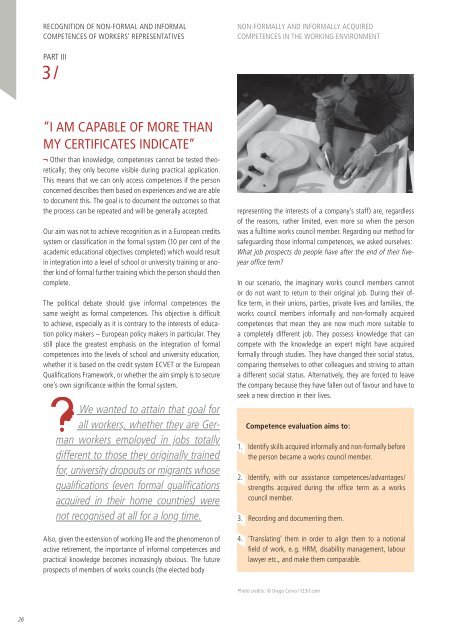RECOGNITION OF NON-FORMAL AND INFORMAL ... - Solidar
RECOGNITION OF NON-FORMAL AND INFORMAL ... - Solidar
RECOGNITION OF NON-FORMAL AND INFORMAL ... - Solidar
Create successful ePaper yourself
Turn your PDF publications into a flip-book with our unique Google optimized e-Paper software.
<strong>RECOGNITION</strong> <strong>OF</strong> <strong>NON</strong>-<strong>FORMAL</strong> <strong>AND</strong> IN<strong>FORMAL</strong><br />
COMPETENCES <strong>OF</strong> WORKERS’ REPRESENTATIVES<br />
<strong>NON</strong>-<strong>FORMAL</strong>LY <strong>AND</strong> IN<strong>FORMAL</strong>LY ACQUIRED<br />
COMPETENCES IN THE WORKING ENVIRONMENT<br />
PART III<br />
3 /<br />
“I AM CAPABLE <strong>OF</strong> MORE THAN<br />
MY CERTIFICATES INDICATE”<br />
¬ Other than knowledge, competences cannot be tested theoretically;<br />
they only become visible during practical application.<br />
This means that we can only access competences if the person<br />
concerned describes them based on experiences and we are able<br />
to document this. The goal is to document the outcomes so that<br />
the process can be repeated and will be generally accepted.<br />
Our aim was not to achieve recognition as in a European credits<br />
system or classifi cation in the formal system (10 per cent of the<br />
academic educational objectives completed) which would result<br />
in integration into a level of school or university training or another<br />
kind of formal further training which the person should then<br />
complete.<br />
The political debate should give informal competences the<br />
same weight as formal competences. This objective is diffi cult<br />
to achieve, especially as it is contrary to the interests of education<br />
policy makers – European policy makers in particular. They<br />
still place the greatest emphasis on the integration of formal<br />
competences into the levels of school and university education,<br />
whether it is based on the credit system ECVET or the European<br />
Qualifi cations Framework, or whether the aim simply is to secure<br />
one’s own signifi cance within the formal system.<br />
We wanted to attain that goal for<br />
all workers, whether they are German<br />
workers employed in jobs totally<br />
different to those they originally trained<br />
for, university dropouts or migrants whose<br />
qualifi cations (even formal qualifi cations<br />
acquired in their home countries) were<br />
not recognised at all for a long time.<br />
Also, given the extension of working life and the phenomenon of<br />
active retirement, the importance of informal competences and<br />
practical knowledge becomes increasingly obvious. The future<br />
prospects of members of works councils (the elected body<br />
representing the interests of a company’s staff) are, regardless<br />
of the reasons, rather limited, even more so when the person<br />
was a fulltime works council member. Regarding our method for<br />
safeguarding those informal competences, we asked ourselves:<br />
What job prospects do people have after the end of their fi veyear<br />
offi ce term?<br />
In our scenario, the imaginary works council members cannot<br />
or do not want to return to their original job. During their offi<br />
ce term, in their unions, parties, private lives and families, the<br />
works council members informally and non-formally acquired<br />
competences that mean they are now much more suitable to<br />
a completely different job. They possess knowledge that can<br />
compete with the knowledge an expert might have acquired<br />
formally through studies. They have changed their social status,<br />
comparing themselves to other colleagues and striving to attain<br />
a different social status. Alternatively, they are forced to leave<br />
the company because they have fallen out of favour and have to<br />
seek a new direction in their lives.<br />
Competence evaluation aims to:<br />
1. Identify skills acquired informally and non-formally before<br />
the person became a works council member.<br />
2. Identify, with our assistance competences/advantages/<br />
strengths acquired during the offi ce term as a works<br />
council member.<br />
3. Recording and documenting them.<br />
4. ‘Translating’ them in order to align them to a notional<br />
fi eld of work, e. g. HRM, disability management, labour<br />
lawyer etc., and make them comparable.<br />
Photo credits: © Diego Cervo / 123rf.com<br />
26
















